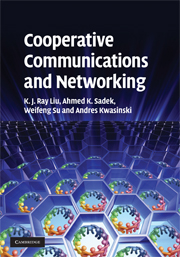Book contents
- Frontmatter
- Contents
- Preface
- Part I Background and MIMO systems
- Part II Cooperative communications
- Part III Cooperative networking
- 11 Cognitive multiple access via cooperation
- 12 Content-aware cooperative multiple access
- 13 Distributed cooperative routing
- 14 Source–channel coding with cooperation
- 15 Asymptotic performance of distortion exponents
- 16 Coverage expansion with cooperation
- 17 Broadband cooperative communications
- 18 Network lifetime maximization via cooperation
- References
- Index
12 - Content-aware cooperative multiple access
from Part III - Cooperative networking
Published online by Cambridge University Press: 06 July 2010
- Frontmatter
- Contents
- Preface
- Part I Background and MIMO systems
- Part II Cooperative communications
- Part III Cooperative networking
- 11 Cognitive multiple access via cooperation
- 12 Content-aware cooperative multiple access
- 13 Distributed cooperative routing
- 14 Source–channel coding with cooperation
- 15 Asymptotic performance of distortion exponents
- 16 Coverage expansion with cooperation
- 17 Broadband cooperative communications
- 18 Network lifetime maximization via cooperation
- References
- Index
Summary
The previous chapter studied the effects and use of cooperation on the multiple access channel. In this chapter we look further into using the properties of the source traffic to improve the efficiency of cooperative multiple access. Because the presentation in this chapter is highly dependent on the characteristics of the source, we will focus on the communication of packet speech. Nevertheless, the main underlying ideas can be extended to other types of sources.
Speech communication has a distinctive characteristic that differentiates it from data communication, which was the main focus of the previous chapter. Speech sources are characterized by periods of silence in between talk spurts. The speech talk–silence patterns could be exploited in statistical multiplexing-like schemes where silent users release their reserved channel resources, which can then be utilized to admit more users to the network. This comes at the cost of requiring a more sophisticated multiple access protocol. One well-known protocol that uses this approach for performance improvement is the packet reservation multiple access (PRMA) protocol [49], which can be viewed as a combination of TDMA and slotted ALOHA protocols. In PRMA, terminals in talk spurts contend for the channel in empty time slots. If a user contends succesfully, then the slot used for contention is reserved for the user. Users with reservations transmit their voice packets in their reserved slots.
Information
- Type
- Chapter
- Information
- Cooperative Communications and Networking , pp. 432 - 456Publisher: Cambridge University PressPrint publication year: 2008
